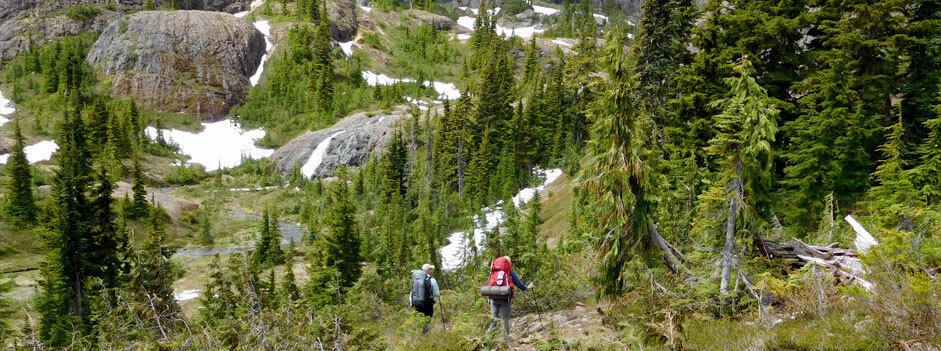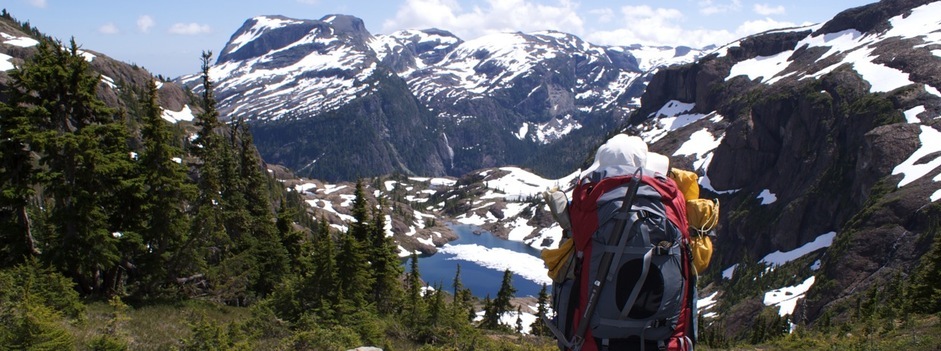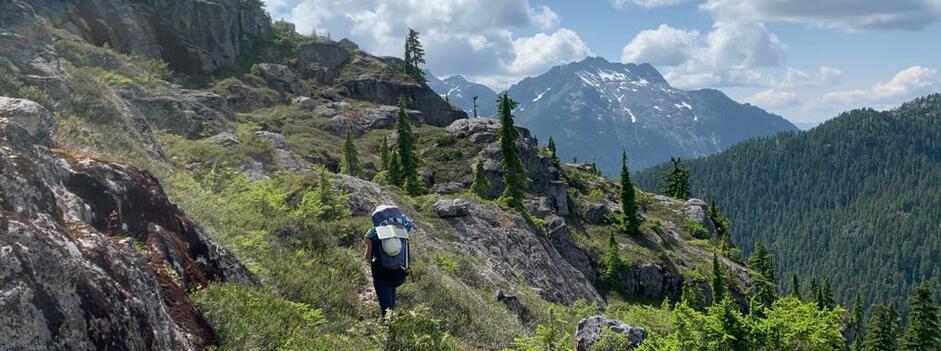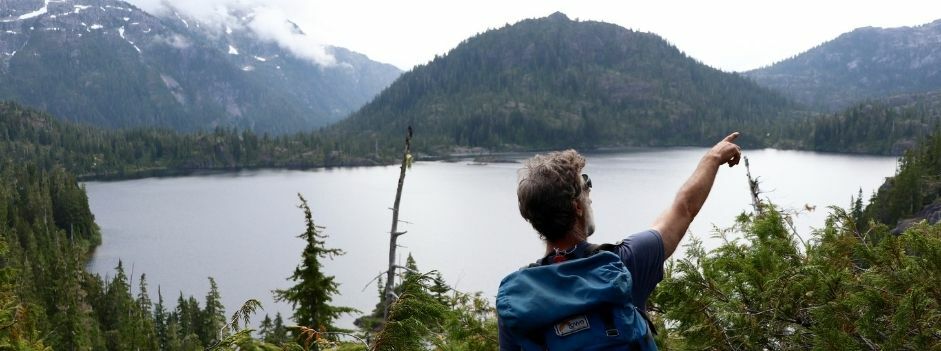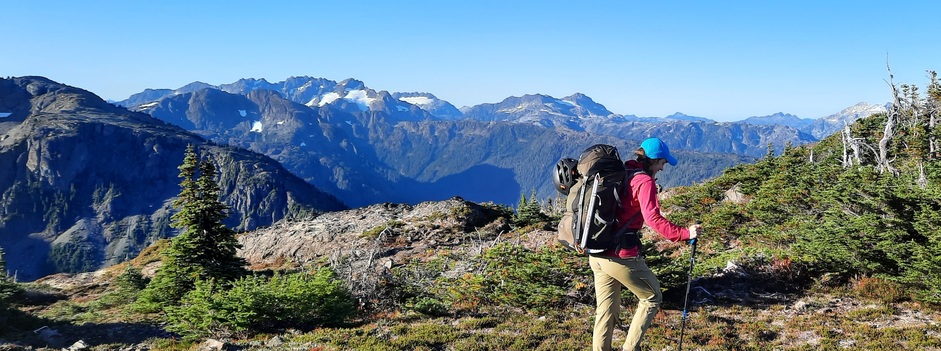.jpg)
As low as:
$425.00 / person
(at 6:1 ratio)Get in touch and we will schedule a trip for you!
Start a new trip
Start a new trip
Add-ons
Backpack rental $20.00
Sleeping mat rental $20.00
Navigation Kit $10.00
Includes a map and compass
About
Gain the confidence to handle most Wilderness Survival situations. Over two days, learn a variety of fundamental outdoor skills, including building (and spending the night in) a minimal gear shelter.
These Wilderness Survival Courses, which take place entirely in the field, are wildly fun, highly practical and provide excellent knowledge for backcountry users travelling in Southwest British Columbia.
Sample Curriculum *content may vary depending on the instructor and/or weather conditions.
- Basic navigation with a map and compass
- Shelter building
- Basic foraging and tracking skills
- Survival psychology
- Pre-trip planning
- Risk management
- Emergency preparedness
- Fire starting/building (winter courses only)
Included in the price
- 2 days of instruction with an ACMG-certified guide
- Group gear
Not included in the price
- Travel (to and from meeting point)
- Accommodation (before and after course)
- Food
- Personal clothing and gear (some items available for rent - see gear list for details)
Questions? Check out our FAQ page for details about our booking and cancellation policy, and other commonly asked questions.
Location
This course is delivered in the forested area that surrounds Forbidden Plateau, and takes place at an elevation of approximately 1000m. As such, this course is best delivered between May and October when there is less likelihood of snow at this elevation.
Accessed from the Old Forbidden Plateau Ski Area and Trailhead, this meeting point is approximately 25 km from downtown Courtenay.
Exact meeting details will be provided in a pre-trip email sent one-week prior.
Exact meeting details will be provided in a pre-trip email sent one-week prior.
Sample Itinerary *content may vary depending on the instructor and/or weather conditions.
Day 1
09:00 - Meet your instructor at Old Forbidden Plateau Ski Area. Here you will make introductions and sign waivers before you begin your hike to the training site (1-2 hours).
You will spend the rest of the day practicing site selection, shelter building and fire-starting, learning about emergency response, mental preparedness and incident management along the way.
You will spend the rest of the day practicing site selection, shelter building and fire-starting, learning about emergency response, mental preparedness and incident management along the way.
You will spend the night in the shelter you’ve built.
Day 2
09:00 – After breakfast, you’ll head out on a hike to practice navigational skills, route-finding, and emergency communication skills like signalling. You will also learn the basics of tracking and edible plant identification.
16:00 - Return to the trailhead and complete a course debrief.
Exact meeting details will be provided in a pre-trip email sent one-week prior.
Exact meeting details will be provided in a pre-trip email sent one-week prior.
Requirements
This course is great for beginners, newcomers to Southwest British Columbia, and those who are looking to further hone fundamental skills.
While there are no prerequisites for this course, participants should be prepared to:
- Spend the night outside in a minimal-gear shelter
- Hike approximately 3-5 km over rough terrain (including bush and possibly snow) with a pack
- Spend two days and one night outside in variable conditions (our courses run in all weather – rain, snow and heat)
Questions? Check out our FAQ page, or send us an email. We are always happy to help you find a suitable course and are happy to offer custom or private courses whenever possible.
Gear List
Temperatures encountered on this trip could range from freezing at night to the twenties by day. The list below should work for these conditions.
Please ensure that all clothing and equipment is in good working order before the course begins, and feel free to reach out with any gear related questions!
Please ensure that all clothing and equipment is in good working order before the course begins, and feel free to reach out with any gear related questions!
Footwear
- Solid hiking boots (waterproof, sturdy enough to carry a pack)
- Gaiters (in spring or late fall)
Clothing
Please note that bushwacking may be a part of this course, clothing should be durable (to prevent pulled/ripped fabric) and long sleeve shirts/pants should be packed (even if it's hot out) to prevent scratched skin.
Please note that bushwacking may be a part of this course, clothing should be durable (to prevent pulled/ripped fabric) and long sleeve shirts/pants should be packed (even if it's hot out) to prevent scratched skin.
- Warm socks, 2 pairs
- Base layers (top and bottom)
- T-shirt or long-sleeve for hiking in (will depend on time of year)
- Hiking pants (nylon or similar)
- Mid-weight insulation layer
- Waterproof jacket and pants
- Warm outer jacket (down or synthetic)
- Warm toque
- Light gloves (if wet conditions, bring an extra warmer pair)
Overnight gear
- Backpack (40-60L, big enough to carry your gear) - limited number available for rent
- Pack liner and/or stuff sacks (line sacks with garbage bag to keep everything dry)
- Sleeping bag (synthetic or down, warm to -5 C)
- Sleeping pad (Therma-rest style inflatable, or closed cell Ensolite) - limited number available for rent
- Survival Blanket or Bivy (SOL Escape Lite recommended – breathable is nice for the West Coast Climate)
- Tarp (2m x 3m)
- 15m of cord (no bigger than 5mm)
- Ground sheet (1m x 2m, can be lightweight plastic)
- Stove, fuel, pot and lighter (available for rent as “Cook Kit”)
- Eating vessel and utensil
- 1x breakfast, 2x lunches (lunches must be prepared ahead and ready to eat on the go), 1x dinner, and as many snacks as you require. For tasty, nutritous and locally pre-made dinners check out https://wildedgeketo.com/
Other
- Compass with sighting mirror (available for rent as “Navigation Kit” add-on)
- 92F/11 Forbidden Plateau Map (available for rent as “Navigation Kit” add-on)
- Knife: a full blade or folding style that locks
- Hat with sun visor
- Sunglasses: 100% UV blockage
- Sunscreen for body, face and lips: 30 SPF min
- Mosquito/Fly Head Net/Suit
- Personal toiletries (keep to a minimum)
- Toilet paper, ziplock bags to pack out toilet paper, and hand sanitizer
- Small first aid kit (medication, Advil, blister kit, etc.)
- Water bottles or hydration system: 1 litre minimum, 2 litres preferred
- Water purification: Pristine drops, Aquatabs, UV pen, Handpump, etc.
- Headlamp
Optional
- Small wilderness hand saw: folding saw, wire saw, etc
- Notebook and pencil
- Camera
- Insect Repellant
- Hiking pole(s): for the ascent and descent and for increased variety in your emergency shelter set up
Rentals
The following items are available for rent as add ons when you book:
- Cook Kit: includes small stove, fuel, pot and lighter for $35
- Navigation Kit: includes a 92F/11 map and a mirrored compass for $10
- Backpack: limited number available for $20, offered on a first come, first served basis.
- Sleeping pad: limited number available for $20, offered on a first come, first served basis.
Please note that these rental add ons are non-refundable, but can be requested up to two days prior to the start of your course.
Questions? Check out our FAQ page and blog for commonly asked questions, or send us an email!
Testimonials
The survival course exceeded my expectations. Brianna was brilliant as the instructor and trip guide. Learning was well paced throughout the weekend focussing on navigation, shelter building, fire making and survival techniques. Her scenarios and camp and sunday hiking location choices were well executed and thoughtful. I will recommend this course to friends and family. 5 star rating!!Lisa Booth, Esquimalt, BC
This course was very informative on navigation and shelter building and starting/maintaining fires, as well as useful tips on who to call in an emergency, how to assess any risks, and necessary steps to help someone if they are injured or missing. Our instructor was extremely knowledgeable and engaging!Naia Patterson, Forbidden Plateau
I absolutely loved the course. The instructor was outstanding. Thanks again and I look forward to taking more courses through you.Roslyn Van der wal,
I really liked how the course was structured around what we wanted to learn, Rob was a great instructor who was really accommodating, patient and kind. He was genuinely interested in why we wanted to take the course and how to best support us in our learning.Lucy Rohatynchuk,

.jpg%20.jpg)
